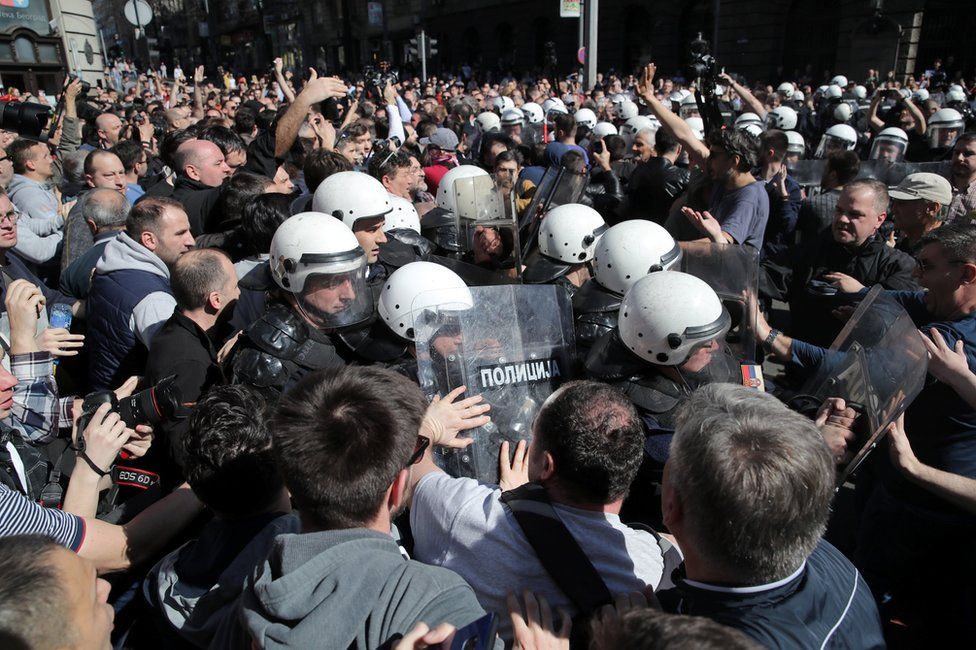Serbia protests: President Vucic the target of Belgrade rally
- Published

Serbian police have used tear gas to clear thousands of protesters trying to blockade the residence of President Aleksandar Vucic in Belgrade.
The protesters - who are demanding greater media freedom and free elections - shouted "Resign!"
But Mr Vucic refused to bow to the pressure, saying: "I am not afraid."
The opposition has been staging largely peaceful rallies for weeks. But tensions escalated on Saturday when crowds stormed the state TV station.
Mr Vucic is a reformed extreme nationalist who now wishes to lead Serbia into the European Union.
What happened on Sunday?
Riot police fired tear gas at the crowds that had gathered outside the presidential residence in the capital.
Many in the crowd blew whistles and shouted "He is finished!"
That was the slogan the slogan of the movement that ousted Slobodan Milosevic in October 2000.
Milosevic was president of Serbia and later Yugoslavia during the latter's violent break-up in the 1990s. His government placed severe curbs on independent media.
In 2001, he was transferred to The Hague to face trial on war crimes charges at the International Criminal Tribunal for the Former Yugoslavia. He was found dead in his cell in 2006, before his trial could be completed.
Addressing the cheering crowds on Sunday, opposition activist Borko Stefanovic said: "We shall continue the blockade of the presidency and we will not leave until our demands are met or unless we get firm guarantees that our demands will be met."
The protest was organised as President Vucic was giving a televised address from inside his residence on Saturday's violence.
"Serbia is a democratic country, a country of law and order and Serbia will know how to respond," the president said, branding the protesters "fascists, hooligans and thieves".
"They think they have the right, 1,000 of them, to determine the fate of the country," Mr Vucic added, probably underestimating the number of protesters involved.
After the president's address, crowds of people marched from the residence to the city's main police station, demanding that the people who were arrested at the Radio Television of Serbia (RTS) building on Saturday night be released.
Once they arrived, they were again locked in a stand-off with riot police outside the front door of the station.
How did the protests start?
In November last year, Mr Stefanovic - leader of the Serbian Left - was beaten up and left unconscious by a group of young men in dark clothing.
Images of his bloodied face and clothes sparked waves of protests in Belgrade.
Opposition leaders blamed President Vucic for the attacks, and accused him of bringing back an autocratic style of rule reminiscent of the Milosevic era.
Critics also accused the president of reviving nationalism and hate speech in the country.
Who is leading the protests now?
Now, one of the most prominent figures in the opposition protest movement is Bosko Obradovic, the leader of the extreme right-wing party Dveri.
He was among those who occupied the public broadcaster RTS's building on Saturday and, according to Balkan Insight, was physically dragged out of the building by police officers.
"We aren't asking for much," Mr Obradovic demanded at the station. "An immediate broadcast with participation of a representative of the organisers of the protests, not of politicians."
Mr Vucic has called Mr Obradovic "a fascist".
- Published10 April 2017
- Published28 January 2019
- Published10 January 2019
- Published8 January